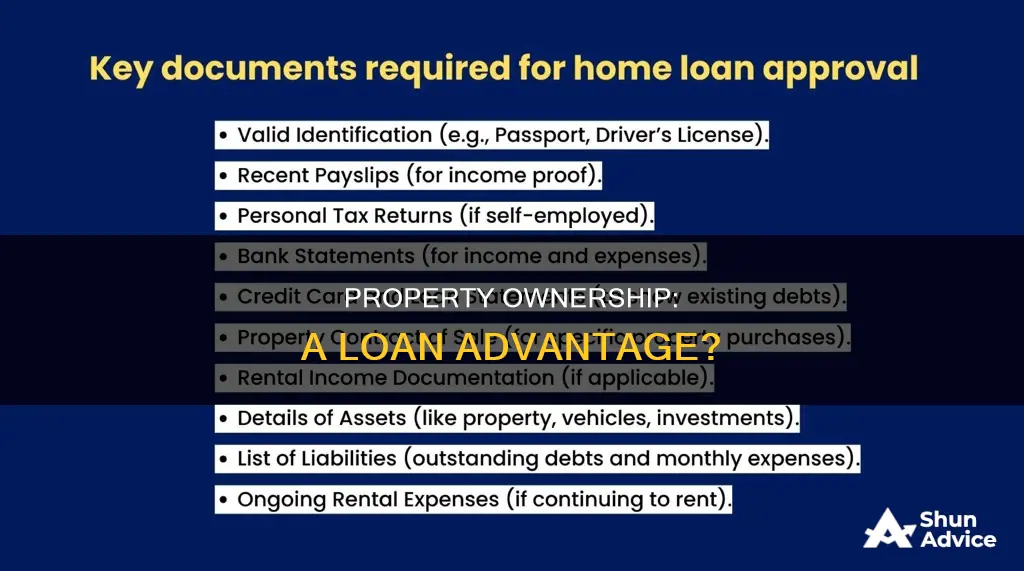
Owning property can increase your chances of getting a loan, as it can be used as an asset to build equity. This equity can be leveraged to obtain a home equity loan or a home equity line of credit (HELOC). While applying for a mortgage may cause a temporary dip in your credit score, financially responsible homeownership can lead to an increase in your credit score over time. Additionally, homeownership provides tax benefits, such as the mortgage interest deduction, which can result in a reduced federal tax bill. However, it is important to carefully manage your finances and consider the risks involved before taking out a loan, as defaulting on a loan could result in foreclosure.
| Characteristics | Values |
|---|---|
| Impact on credit score | Owning property can lead to an increase in credit score over time, due to the diversification of payment history and improved credit mix. However, there is often an initial dip in credit score after the purchase due to the increase in overall debt. |
| Building equity | Property owners can build equity over time, which can be leveraged for home equity loans or home equity lines of credit (HELOC). |
| Financial stability | Homeownership provides stability and control over the living space, eliminating the stress of potential rent increases. Fixed-rate mortgages offer predictable monthly payments. |
| Tax benefits | Homeowners can benefit from tax deductions on mortgage interest, home equity loan interest, and property taxes, potentially reducing their federal tax bill. |
| Appreciation | Home values tend to increase over time, leading to potential wealth accumulation for homeowners. |
| Debt-to-income ratio | Owning property increases overall debt, affecting the debt-to-income ratio, which is a factor considered by lenders when evaluating loan applications. |
| Loan options | Property owners have access to various loan options, such as home equity loans, HELOCs, or cash-out refinances, allowing them to access their home's equity without selling the property. |
What You'll Learn

Homeownership and credit score
Homeownership comes with many benefits, including the potential for financial stability and building equity. However, it is essential to understand how homeownership can influence your credit score, especially when considering the impact of mortgage loans.
When you apply for a mortgage, lenders will perform a hard credit inquiry, which can cause a slight drop in your credit score. This initial dip is typical and occurs because your overall debt increases, and the credit scoring algorithm considers you to be seeking new credit. Additionally, if you are a first-time homeowner, adding a mortgage to your credit profile can lead to a more significant decrease, especially if your debt-to-income ratio is already high.
However, the impact of homeownership on your credit score is not solely negative. Over time, as you make continuous and timely mortgage payments, your credit score can improve. Lenders evaluate your ability to manage your new mortgage and debt payments, and consistent on-time payments demonstrate financial responsibility. This positive payment history becomes a significant factor in enhancing your credit score.
Furthermore, homeownership allows you to build equity, which can be leveraged for home equity loans or lines of credit. These financial tools provide access to funds for home improvements, debt consolidation, or other financial goals. By utilizing your equity wisely, you can increase the resale value of your home and build wealth.
While owning multiple properties can positively contribute to your credit mix, it also increases your overall debt and affects your debt-to-income ratio. Therefore, careful personal finance planning is necessary to ensure that multiple mortgages have a positive impact on your credit score.
Can You Have Multiple Loans with OneMain Financial?
You may want to see also

Loan options for paid-off houses
Owning a property can have a complex impact on your credit score. While it demonstrates financial responsibility and can improve your credit score over time, taking on a large debt like a home loan can lead to an initial dip in your score. However, if you've already paid off your home, you have the option to leverage your equity and take out a loan. Here are some loan options to consider:
Home Equity Loan
A home equity loan allows you to borrow against the equity you've built up in your home. It's a way to access your home's equity without selling the property. Lenders will consider factors such as your credit score, debt-to-income ratio (DTI), and loan-to-value ratio (LTV) to determine your eligibility and loan terms. Home equity loans typically have fixed interest rates, and you'll make monthly payments until the loan is paid off.
Cash-Out Refinance
A cash-out refinance is a way to leverage the equity in your home by replacing your existing mortgage with a new one at a higher balance and pocketing the difference. This option can provide you with a lower interest rate compared to other financing options, but closing costs tend to be high. It's important to evaluate the overall costs and whether this option aligns with your financial goals.
Home Equity Line of Credit (HELOC)
A HELOC is a type of mortgage that turns your equity into a line of credit, allowing you to withdraw funds as needed. HELOCs typically have variable interest rates, which can make them riskier than home equity loans. However, they offer flexibility in repayment and re-borrowing. Most HELOCs require interest-only payments during the draw period, which is often around 10 years. After that, you'll make full interest and principal payments.
Home Equity Conversion Mortgage (HECM)
If you're a homeowner aged 62 or older, you may be eligible for a HECM, the most common type of reverse mortgage. With a HECM, the lender makes payments to you, and your loan balance grows over time. You can choose to receive the proceeds as a lump sum, a line of credit, or in monthly payments. This option provides flexibility in using the loan amount for various purposes.
When considering any of these loan options, it's important to carefully evaluate your financial situation, understand the risks involved, and compare offers from multiple lenders to find the most suitable option for your needs.
Ocwen Loan Modification: What You Need to Know
You may want to see also

Tax benefits of owning a home
Owning a home comes with a host of financial and tax benefits. Here are some of the key tax advantages of homeownership:
Tax Deductions
Homeowners may be eligible for various tax deductions, including mortgage interest, property taxes, and certain other expenses. These deductions can significantly reduce taxable income and result in substantial savings. It is important to note that some expenses, such as insurance, are not deductible.
Exclusion of Imputed Rental Income
Homeowners do not pay taxes on the imputed rental income from their homes. This means they can live in their homes rent-free, effectively, without paying taxes on this benefit.
Capital Gains Exclusion
When selling a home, homeowners may exclude a portion of the capital gains realized from the sale, up to a certain limit. This can result in significant tax savings, especially if the home has appreciated in value.
Home Equity Loan Interest Deduction
In some cases, interest paid on a home equity loan may be tax-deductible. This can provide additional financial flexibility for homeowners who borrow against their home equity.
Mortgage Interest Credit
The Mortgage Interest Credit helps lower-income individuals afford homeownership by allowing them to claim a credit each year for a portion of the home mortgage interest paid. This credit is available to those who have a qualified Mortgage Credit Certificate issued by their state or local government.
It is important to note that tax laws and regulations can vary by location and are subject to change. Homeowners should consult with a tax professional to understand their specific tax situation and take advantage of all applicable tax benefits.
OnDeck's Startup Loan Options: What You Need to Know
You may want to see also

Home equity and loan eligibility
Owning a home can increase your loan eligibility, as it adds an asset to your name and allows you to build equity. Equity is the difference between the market value of your property and the outstanding balance on your mortgage. This equity can be used as leverage to obtain a home equity loan or a home equity line of credit (HELOC).
Home equity loans and HELOCs are second mortgages that allow you to borrow against the equity in your home. The loan amount is typically based on the property value and the loan-to-equity ratio, with most lenders requiring a minimum of 15-20% equity to be maintained in the property. It is important to note that defaulting on a home equity loan can have severe consequences, including foreclosure.
When considering a home equity loan or HELOC, it is essential to understand the eligibility requirements. Most lenders require a minimum credit score of 640, a steady income, and a debt-to-income (DTI) ratio of 50% or less. The DTI ratio is an important factor in determining your loan eligibility, as it indicates a healthy balance between income and debt. Additionally, lenders will consider the loan-to-value (LTV) ratio, which is the ratio of the loan amount to the value of your home. Lenders typically prefer a lower LTV as it represents less risk for them.
While owning a home can increase your loan eligibility, it is important to carefully consider your financial situation before taking on additional debt. It is advisable to compare different loan options, evaluate monthly payments, interest rates, and the loan's lifespan to make an informed decision. Additionally, seeking expert advice and understanding the risks involved are crucial steps in the process.
Explore One Main Financial's Loan Options with a Cosigner
You may want to see also

Mortgage rates for second homes
Owning property can increase your chances of getting a loan. Property ownership can improve your credit score over time, demonstrating financial responsibility and contributing positively to your credit mix. It also provides you with an asset that can be leveraged to obtain a home equity loan or line of credit. However, it is important to note that taking on a large debt, such as a mortgage, can initially cause a decrease in your credit score, especially if your debt-to-income ratio is already high.
Now, regarding mortgage rates for second homes, it's important to understand that these rates are typically higher than those for primary residences. This is because lenders consider second homes to be riskier investments. In the event of financial hardship, homeowners are more likely to prioritise paying off the mortgage on their primary residence. As a result, lenders often require stricter credit and debt-to-income (DTI) ratio requirements for second home mortgages.
There are various ways to finance a second home. One option is to tap into the equity in your primary residence through a home equity loan or a cash-out refinance. You could also borrow against your investments or simply pay cash if you have the means. It's important to carefully consider your financial situation and seek out the most competitive rates and terms for your second home mortgage.
When taking out a mortgage on a second home, it's crucial to understand the risks involved. Defaulting on the loan could result in foreclosure. Additionally, if you plan to rent out the second home, it may be considered an investment property by the lender, which could lead to even higher interest rates and more stringent requirements.
While mortgage rates for second homes are typically higher, they can vary depending on the lender and the market conditions at the time of taking out the loan. It's always a good idea to compare rates from multiple lenders and use tools like mortgage calculators to find the most affordable option.
Boat Loans: One Main Financial's Marine Financing Options
You may want to see also
Frequently asked questions
Owning property means you have an asset and have built up equity, which can be used as leverage to obtain a loan. Therefore, owning property can increase your chances of getting a loan.
Each monthly payment towards your property builds home equity, which is the difference between your home's value and your remaining loan balance. Over time, you pay more of your loan balance and build more equity.
Your credit score is a significant factor in determining your eligibility for a loan. A higher credit score demonstrates your creditworthiness and can help secure better loan terms. When you apply for a loan, lenders will perform a hard credit inquiry, which will cause a temporary dip in your credit score.
Taking out a loan against your property can put your home at risk of foreclosure if you default on the loan. It is important to understand the financial commitment and evaluate the monthly payments, interest rate, and lifespan of the loan before proceeding.







